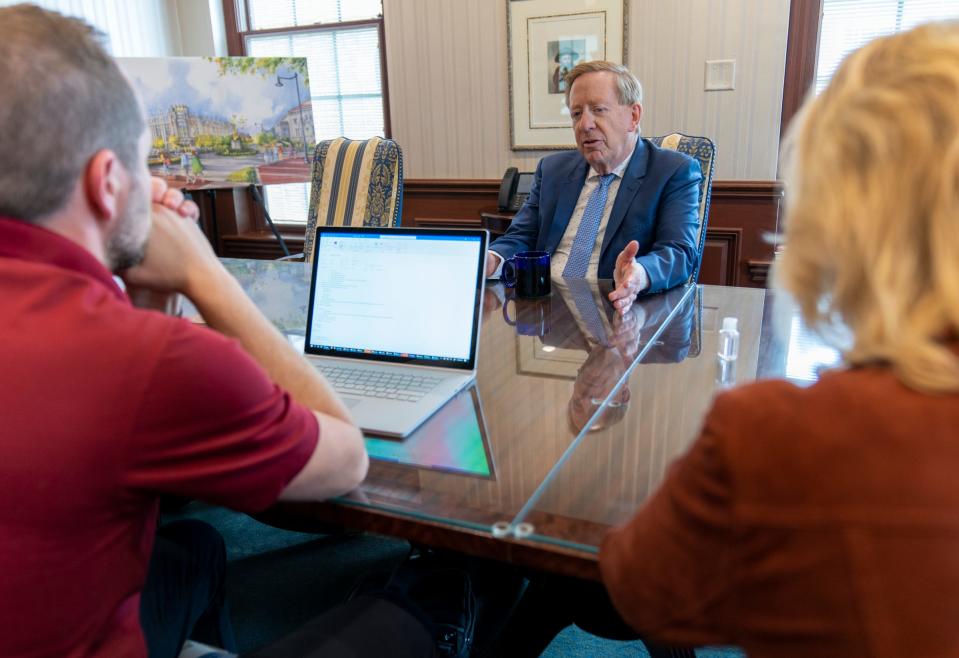Indiana House votes to ban sister city deals with China and U.S. adversaries
The Indiana House approved a proposal earlier this week to ban cities from sister city arrangements with China and five other adversarial nations.
The measure, introduced by Rep. Ben Smaltz R-Auburn, follows a push by Republican U.S. Rep. Jim Banks to get Carmel to drop its membership with a China business and cultural exchange organization. Banks contends that the Chinese government uses ties to cities to infiltrate the U.S. government.
Senate Bill 256 prohibits cities from making agreements with countries listed as foreign adversaries under federal law: China, North Korea, Russia, Cuba, Iran and Venezuela.
Last month, Carmel Mayor Sue Finkam agreed to withdraw her city's $25,000 yearly dues-paying membership in the United States Heartland China Association but kept the sister city relationship with Xiangyang, Hubei.

Banks said the association has collaborated with Chinese state-sponsored organizations aiming to “infiltrate and influence the United States and other foreign governments.” And he criticized former Carmel Mayor Jim Brainard and a handful of other mayors for visiting China last fall, where he said they were “wined and dined” by officials in China.
Brainard, the United States Heartland China Association vice chairman, denied the organization has ties to the Chinese government and accused Banks of lying about it.
Smaltz said in a Feb. 27 House Ways and Means meeting that he was “inspired” by Rep. Mitch Gore, D-Indianapolis, to introduce the language banning certain sister city agreements into the unrelated Senate Bill 256. Gore had unsuccessfully tried to stick an identical provision on a bill on the House floor, inspired, he said, by Banks’ actions.
“We know that China tries to use soft power to influence the U.S. economy,” Gore told IndyStar. “To be wined and dined there is concerning.”
Finkam praised Carmel's sister city agreement.
"Our sister city relationships around the world, like the one with Xiangyang, provide great cultural value to our residents including the many freedom-loving Chinese Americans who call our great city home," she said in an email to the IndyStar. "However, I take the safety of our nation and city very seriously. If state law declares any of our sister city relationships to be illegal, we will comply with state law.”
Nineteen Indiana cities have sister city arrangements with cities in China, including Indianapolis, Fishers and Fort Wayne, according to Indiana Sister City Cities International. It’s uncertain whether Smaltz’s proposal would void those agreements. He did not respond to a request for comment. Gore said his amendment would have “canceled” those agreements.

Proponents of sister cities say they foster goodwill between citizens, even when diplomatic conditions are rocky.
"This is shortsighted,” said Peter Kirkwood, chief of protocol for the International Center, an Indianapolis-based nonprofit organization. “The focus must be on the long term."
Kirkwood is the state representative for Indiana Sister Cities International and helped put together Carmel’s arrangement with Xiangyang in 2012.
“Sister cities are mutually beneficial peacebuilding, citizen diplomacy, no matter what the geopolitical conditions are,” he said. “It’s a people-to-people relationship that fosters peace and respect.”
Jenning Li, who headed the Fort Wayne sister city program with Taizhou, China, for 12 years, said student exchanges are valuable to citizens of both countries.
“Students in China have heard all different stories about the United States and students here hear stories about China,” he said. “Then when they go there they find out what it is like and gain a new understanding.”
Many of the state’s arrangements with Chinese cities are more than a decade old, set up in the years after China joined the World Trade Organization in 2001 when trade was robust.
“Our main purpose was economic,” Li said. “To gain job opportunities on both sides.”
But economic tensions have worsened since then in many respects between the two countries, with China’s state-led development and investment in the United States raising national security concerns.
“Now it is a different environment, China’s economy is not that good anymore,” Li said.
Gore said the cultural exchanges were suspicious in the current environment.
“On the surface, they appear to be cultural but when trips are taken to another country and they buy your meals, who knows what is being discussed, it could be anything,” he said. ‘This only applies to adversary countries. It’s not xenophobic as it appears.”
The United States Heartland China Association is a nonprofit formed to strengthen economic, cultural and personal ties with China, according to its website. Its members include 27 mayors from 20 Midwestern states. Brainard took a trip with other mayors to China last November.
The ban is not a done deal. The version of the bill that passed the Senate did not include the language, which means the House and Senate still have to negotiate the final bill version before it can be sent to the governor.
The 172-page Senate Bill 256 in its current form also contains language eliminating the sales tax on tampons and giving more money to families caring for children with medically complex conditions.
Call IndyStar reporter John Tuohy at 317-444-6418 or email him at [email protected]. Follow him on Facebook and X/Twitter.
This article originally appeared on Indianapolis Star: Indiana House votes to ban sister city relationships with China
Solve the daily Crossword

